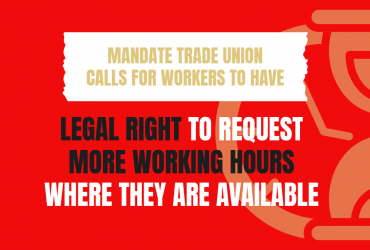Mandate Trade Union to Advise its 45,000 Members to Vote No to Proposed Fiscal Treaty
Sunday 22 April 2012Douglas tells conference delegates that the Treaty, if passed, will institutionalise austerity in Ireland for decades to come
The Mandate Trade Union has today announced that it will be advising its members to vote no in the forthcoming referendum on the proposed EU Fiscal Treaty. The announcement was made by the union’s General Secretary, John Douglas, at Mandate’s Biennial Delegate Conference which is being held today and tomorrow (Sunday, 22 and Monday, 23 April) in White’s Hotel, Wexford – a ‘Fair Hotel’ that recognises its workers’ right to join and be represented by a trade union, in this case SIPTU.
Mandate is one of the country’s largest unions and represents over 45,000 workers mainly in the retail trade. The theme of the conference, which is being attended by over 300 delegates from all around the country, is Decent Work = Better Future.
During his address to the Biennial Conference, John Douglas, said that Mandate Trade Union makes no apology for campaigning for a no vote in the Fiscal Treaty Referendum on 31 May next.
“The Fiscal Treaty if passed will not create one job; on the contrary it will legally lock down Irish economic activity at its current levels, and may even shrink domestic demand further leading to mass unemployment, decades of emigration and sow the seeds for future social conflict. We strongly urge all our members not only to vote no to the Treaty, but to get involved in their local ‘no campaign’.”
Mr Douglas said that the sad reality is that the austerity policies now being pursued by the current government as part of the ongoing Troika Bailout Agreement are choking the life out of the Irish economy, particularly the domestic economy.
“There are over 400,000 Irish workers without jobs, 50,000 are leaving the country each year, tens of thousands of families are being crushed under the burden of unsustainable mortgages and living in fear of eviction. Living standards, welfare and services are being slashed, the government is introducing a raft of regressive charges and taxes, a recent Irish League of Credit Unions report showed that 50% of those surveyed had less than €100 left to spend at the end of the month after paying all bills – what sort of an existence is this?
“The imposition of austerity measures across Europe has resulted in over 25 million workers unemployed, of which 5.5 million are under the age of 25. This is a scandal, human waste of mega proportions – but still, our government at the behest of our European banking masters continues with these failed policies and ideologies, condemning future generations of Irish citizens to a mere existence on the margins of society.
“This Treaty has nothing to do with ‘good housekeeping’ or ‘managing the household budget’; it is about copper fastening into an internationally legally binding agreement, decades of austerity, social exclusion, mass long term unemployment and emigration – and a continuation of attacks on workers’ rights and the welfare system. It is not about what is good for Irish citizens, or the citizens of Europe, it is a treaty of the Right for the Right!”
John Douglas explained to the delegates at the Mandate conference that voting no in itself is not a solution, but the start of one.
“We demand that this government embarks on an investment strategy for growth and for jobs, that this government puts the needs of its own citizens above the needs of the banks’ balance sheets. This government needs to move quickly on the issue of personal debt forgiveness and in particular the unsustainable levels of mortgage repayments which are sucking the life blood out of consumer spending. Unfortunately, at this point in time this government seems intent on washing clean bank balance sheets by removing tracker mortgages while at the same time keeping their foot on the throats of hard pressed mortgage holders.
“Since the start of this crisis, the trade union movement has advocated that while we must manage our budgets, economic growth is key – economic growth to turn our domestic economy around. The trade union think tank, the Nevin Economic Research Institute (NERI), has identified funding sources of up to €15 billion for investment in vital infrastructure and services. This level of investment would clearly improve our national infrastructure, boost demand by creating much needed economic activity and jobs,” John Douglas concluded.





